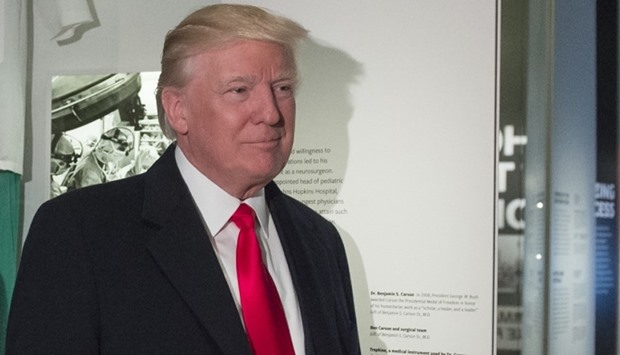As US President Donald Trump prepares to mark his first 100 days in office on Saturday, his foreign policy in Asia — especially China, North Korea and Japan — has assumed a central role in his young administration.
In March and April, Trump dispatched to the region three of his top deputies — Defence Secretary James Mattis, Secretary of State Rex Tillerson and Vice-President Mike Pence — for meetings with top leaders, underscoring Asia’s vital importance to US interests.
Foremost on the agenda at all of these meetings was how to address the increasing tensions on the Korean peninsula.
Trump has said he offered Chinese President Xi Jinping a better trade deal in exchange for Beijing doing more to rein in North Korea’s nuclear and missile programme, which the White House has labelled “the most dangerous and urgent threat” to the Asia-Pacific region.
Ahead of Tillerson’s visit to Beijing in March, Trump tweeted that “China has done little to help” on North Korea.
But a short talk with Xi at Mar-a-Lago in early April seemed to have changed the president’s mind.
“After listening for 10 minutes, I realised it’s not so easy,” Trump told the Wall Street Journal.
“I felt pretty strongly that they had a tremendous power [over] North Korea....But it’s not what you would think.”
The White House has since said Trump’s suggestion that Xi take a tougher line with Pyongyang is “paying off” and China is playing a “much more active role” with respect to North Korea.
However, US officials recently reiterated that regardless of China’s contribution, the US will not stand idly by while North Korea continues its nuclear programme, though Trump has decided to keep his cards close to his chest on how exactly he would respond to a new nuclear test by Pyongyang.
Trump’s broader views on China have shifted drastically since he took office and — to an even greater extent — after meeting with Xi in Florida in early April.
Trump has run the gamut in his statements about the world’s second-largest economy, from calling China an enemy in his book Crippled America (2015) to hailing a “deepening” friendship between the two countries after Xi’s visit to the US.
Throughout his election campaign, Trump blasted China for taking US jobs and vowed to crack down on Beijing for what he saw as unfair trade advantages, including currency manipulation, dumping and intellectual property theft.
He promised to label Beijing a currency manipulator “on day one” of his presidency.
Instead, after meeting Xi he backtracked on his accusations, saying such an action would deter China from helping to address North Korea’s nuclear threat.
“They’re not currency manipulators,” Trump told the Wall Street Journal a few days after the Mar-a-Lago summit.
With Japan, Trump has taken “halfway measures” in his foreign policy, says Akikazu Hashimoto, a political science professor and expert on US-Japan relations at JF Oberlin University in Tokyo.
Trump’s policy towards Japan has been “unpredictable,” he adds.
Yet, like many Japanese leaders in the past, Prime Minister Shinzo Abe has been criticised for dancing to the tune of Washington even under the new US leadership.
When it comes to trade issues, Trump, who as a presidential candidate campaigned on putting the United States first, has made Japan wary that it could face increasing pressure from the US government.
Trump has reminded many Japanese of the “Japan bashing” and trade friction between the two countries in the 1980s.
However, Washington did not voice criticism even during Pence’s visit on April 18 and 19, as key posts have yet to be filled under Trump.
Pence and Japanese Deputy Prime Minister Taro Aso launched a bilateral economic dialogue, a framework that could make Japan face stronger US pressure, analysts said.
“Japan could be put into a disadvantageous position” against the US, says Hashimoto. “When it comes to issues of trade and economy, the United States won’t make a compromise.”
Robert Lighthizer, the president’s nominee for US trade representative, who has not been confirmed, said in March he would press Japan to further open its agriculture sector during his Senate confirmation hearing.

US President Donald Trump
